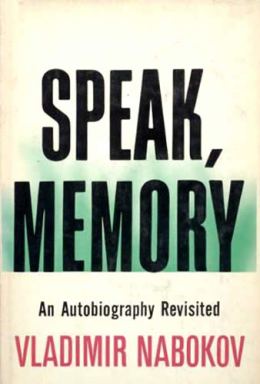In March of 1919, the Reds broke through in northern Crimea, and from various ports a tumultuous evacuation of anti-Bolshevik groups began. Over a glassy sea in the bay of Sebastopol, under wild machine-gun fire from the shore (the Bolshevik troops had just taken the port), my family and I set out for Constantinople and Piraeus on a small and shoddy Greek ship Nadezhda (Hope) carrying a cargo of dried fruit. I remember trying to concentrate, as we were zigzagging out of the bay, a game of chess with my father--one of the knights had lost its head, and a poker chip replaced a missing rook--and the sense of leaving Russia was totally eclipsed by the thought that Reds or no Reds, letters from Tamara would still be coming, miraculously and needlessly, to southern Crimea, and would search there for a fugitive addressee, and weakly flap about like bewildered butterflies set loose in an alien zone, at the wrong altitude, among an unfamiliar flora.
There's something unexpected about the idea that Vladimir Nabokov would write a memoir. There's no space in a "traditional" memoir for the kind of parlor tricks that populate his novels, and the practice of putting down a real life, faithfully, on the page, seems quite at odds with the many concealed identities of Nabokov's narrators: Charles Kinbote, pretending--maybe--to be John Shade while concealing his identity as an exiled king, or Humbert Humbert entering baroque joke names into the registers of American motels. But now that I think about it, there's something Kinbote-like about Speak, Memory, which is at heart about exile.
One thing that surprised me to learn--though perhaps I knew it once--is that the young Nabokov was quite an aristocrat. His childhood at St. Petersburg was spent at a cluster of family estates, with holidays at country dachas and in Paris; his father, Vladimir Sr., was a minister whose taste for liberal reform disquieted his elders, who thought--quite correctly, it turns out--that he was ensuring his own obsolescence. Nor did I know that Nabokov's father was assassinated by Tsarists, an event that is only lightly touched on here, an event too difficult to write about, perhaps, or in its sheer magnitude lacking in the kind of impressionistic detail that develops the book's theme of nostalgia.
Though I knew Nabokov was exiled by the Bolsheviks, I was surprised at the book's rich cultivation of the early 19th century, rather than the mid-century era I associate with Nabokov's novels. (We overhear, for instance, that Tolstoy has just died.) This world is seen through a veil of nostalgia, so to speak, because we know it is lost, inaccessible not just in the way that all our childhoods are inaccessible. This is the main charge that Nabokov brings against the Bolsheviks, an apolitical charge in a book that seems to take great pains to be apolitical:
My old (since 1917) quarrel with the Soviet dictatorship is wholly unrelated to any question of property. My contempt for the emigre who "hates the Reds" because they "stole" his money and land is complete. The nostalgia I have been cherishing all these years is a hypertrophied sense of lost childhood, not sorry for lost banknotes.
Among the memoir's many pleasures is Nabokov's loving and detailed attention to the people who made up his childhood life: his hapless Swiss governess known as Mademoiselle, his rigid tutor Lenski. I loved, too, reading about the young Nabokov's love for butterflies. Nabokov's success as a lepidopterist has become a Thing to Know about him, but to read the wistful accounts of Orange Hairstreaks and Poplar Admirables (this is, I believe, Nabokov's winking nickname for those butterflies known as "Admirals") in Speak, Memory brings such knowledge to life. There is a touching bittersweetness in the knowledge that these butterflies have their own climates and regions, and that the exile of young Nabokov separated him from them. And yet Nabokov treats the event itself with a surprising lightness: on the moment he leaves Russia for the last time, he's locked in a chess match with his father, thinking of the girl he's leaving behind.


No comments:
Post a Comment